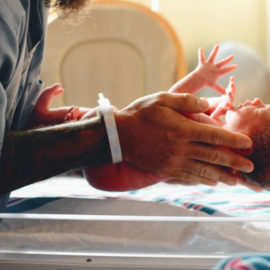
Does your child know that it’s okay to make mistakes? Do you try to fix your child’s mistakes for them?
In her book 13 Things Mentally Strong Parents Don’t Do, Amy Morin stresses the importance of not fixing your child’s mistakes for them. Children need to learn that there are consequences to their actions, otherwise they’ll keep making the same mistakes.
Here’s how to help your child develop resilience.
Mentally Strong Parents Don’t Protect Their Children From Mistakes
One of Amy Morin’s tips is to not fix your child’s mistakes for them—it’s okay to make mistakes.
Morin says that messing up—and facing the consequences—is one of the most effective ways for children to learn. Therefore, it’s crucial that you don’t jump in to fix every little mistake your child makes.
For example, if your child forgets their homework at school, don’t drive them back out to get it. Letting your child experience the embarrassment of admitting they didn’t do their homework, and the shame of getting a zero on that assignment, will go a long way toward making sure they’re more responsible in the future.
(Shortform note: Making mistakes is a great way to learn, but only if the person is ready to learn from their mistakes. In Ego Is the Enemy, Ryan Holiday explains that having excessive pride—in his words, ego—can make this learning process impossible. This is because learning from mistakes requires the person to truthfully examine what went wrong, figure out how they caused or contributed to the problem, and determine how they can do better next time. However, their ego will only want to look at what they did right and blame any failures on others. Therefore, after making a mistake, your child might need your help to remain calm so they can rationally examine what happened and what they could learn from the experience.)
Furthermore, Morin says the single most important lesson children learn from making mistakes is how to recover from such mistakes. In other words, by allowing your child to make mistakes and learn from them, you’ll help them to develop resilience, independence, and problem-solving skills.
Conversely, children who grow up shielded from consequences tend to develop into anxious, uncertain adults. Because they never learned how to deal with mistakes, they become terrified of doing anything wrong once that protection is gone. As a result, they often become perfectionistic and unwilling to take risks.
Finally, Morin adds that even though you aren’t protecting your child from their mistakes, you can still offer them much-needed support during this learning process. One way to do this is by telling them about times that you made mistakes and learned from them; this will help instill the idea that nobody’s perfect, mistakes are a part of life, and the truly important thing is how to turn those mistakes into personal growth.
| How a Growth Mindset Builds Failure Resilience The key to recovering from failure (or helping your child do so) is developing what psychologist Carol Dweck (Mindset) calls a growth mindset. In simple terms, people with this mindset believe that it’s possible to build upon their natural talents and abilities; therefore, they view failures as opportunities for learning and improvement. By embracing challenges and viewing failures as temporary obstacles to overcome, those with a growth mindset are better equipped to bounce back from adversity and continue pursuing their goals with resilience and determination. In contrast, people with fixed mindsets believe that skills and intelligence are purely inherent, and can’t be improved upon. Therefore, someone with this mindset views failure as a reflection of their identity; they don’t just think “I failed,” they think “I am a failure.” Furthermore, since they don’t think that it’s possible to improve, they give up after their first failed attempt, which is the opposite of failure resilience. The good news, Dweck says, is that you can develop a growth mindset even if you don’t naturally have one. The fixed mindset is inherently judgmental, so the trick to overcoming that mindset is to recognize judgmental thoughts—both about yourself and others—and replace them with learning-oriented thoughts. Therefore, when your child says something like “I can’t do it” (a judgmental thought), you could encourage them to instead think about how they could get a little closer to achieving the thing they’re trying to do. |






